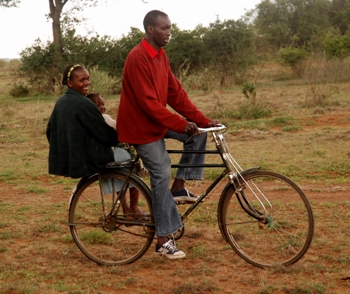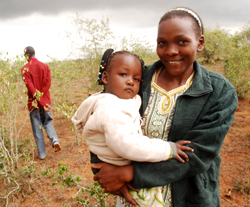Two of the world’s most serious issues—poverty and climate change—are interconnected. With a rise in one’s income there usually comes a rise in one’s carbon footprint, thereby threatening the environment. Wealthy nations have the highest per capita carbon footprints, while developing nations like India and China—which are experiencing unprecedented economic growth—are becoming massive contributors of greenhouse gases. However, it is those who have the smallest carbon footprint—the world’s poor—who currently suffer most from climate change. Food crises, water shortages, extreme weather, and rising sea levels have all hit the poor the hardest.
The difficulty is then how to fight global poverty without contributing to climate change. This dilemma is sure to be front-and-center at the Summit on Climate Change in Copenhagen, which opened today as poorer nations are asking wealthy countries to aid them financially with adaptation and mitigation to climate change.
 Rhoda and family on their bicycle, their main means of transportation. Photo courtesy of Wildlife Direct. |
To look at the dilemma on a personal level, conservation organization Wildlife Direct recently interviewed an average Kenyan to gauge her carbon footprint while exploring her views on climate change (video below). A domestic worker, Rhoda, lives with her husband, daughter, and grandmother.
In the interview with Paula Kahumbu, Executive Director of Wildlife Direct, Rhoda says that she cooks with a kerosene stove, eats meat twice a month, uses a few plastic bags every week, and two plastic bottles a week. The family travels by bicycle, but when they go far they travel by matatu, a public transport vehicle.
“We don’t have any electricity. That is the most problem we have, because we have to use a lot of paraffin [fuel] in our lamps and we can’t watch the news,” she says.
According to Wildlife Direct, Rhoda contributes 1.345 tons a year of carbon to the atmosphere. Rhoda is above the average carbon footprint in Kenya, which is 0.31 tons a year, but this figure includes children and nomadic tribes who have extremely small carbon footprints.
Rhoda is well below the average worldwide carbon footprint of four tons. The average for industrialized nations is eleven tons (eight times bigger than Rhoda’s footprint). Rhoda is even below the current world target to combat climate change, which is two tons. Overall, Africa is considered the front line of the climate change-impact even though most African countries have contributed very little to the problem.
  Top: Rhoda being interviewed by Kahumbu. Bottom: Rhoda with daughter Winne, husband in background. Photos courtesy of Wildlife Direct. |
While Rhoda does not know what ‘carbon dioxide’ means she says she has suffered from Kenya’s recent drought, which many believe was exacerbated by climate change. Kenya is just now receiving rainfall after the worst drought in at least a decade.
Rhoda says that one solution to Kenya’s drought is “just to plant a lot of trees. That is the most important. My husband has planted a lot of trees.”
Rhoda’s income is five dollars a day. She uses part of this to support her extended family living in northern Kenya. Kahumbu says that Rhoda currently lives on less than two dollars a day: a common definition of poverty.
“She’s definitely poor but she’s not starving,” Kahumbu told mongabay.com.
Despite being what many in the industrial world would see as ‘poor’, Rhoda says that she is happy because she is in good health and has a job. She says she worries about whether or not her family will ever be able to purchase—whether than rent—their house. Rhoda also says she would like her daughter to become a doctor in America someday: “there is a lot of money there. Anyway, you can’t do anything without money.” But currently she does not have enough money to put her daughter in school.
If efforts to tackle climate change and global poverty are to succeed, policymakers cannot forget people like Rhoda.
“The decision-makers at Copenhagen must offer solutions on how to alleviate global poverty without aggravating climate change,” says Kahumbu.
Voice of the poor in Africa facing climate change. Video by Wildlife Direct.
Related articles
World requires radical new economic models to fight poverty and mitigate global warming

(11/30/2009) A new report calls for a radical re-envisioning of current economic models in order to tackle poverty, mitigate and adapt to climate change, and solve other environmental problems. The report was crafted by the New Economics Foundation (NEF) and the International Institute for Environment and Development (IIED) and was supported by The Working Group on Climate Change and Development, which includes a wide variety of well-known groups, including environmental, religious, and anti-poverty organizations.
200 million more people going hungry
(10/26/2009) The war on hunger is becoming a rout—and we’re losing. The UN World Food Program (WFP) announced today that during the last two years 200 million more people are going hungry.
Kenya’s pain: famine, drought, government ambivalence cripples once stable nation

(09/17/2009) Kenya was once considered one of Sub-Saharan Africa’s success stories: the country possessed a relatively stable government, a good economy, a thriving tourist industry due to a beautiful landscape and abundant wildlife. But violent protests following a disputed election in 2007 hurt the country’s reputation, and then—even worse—drought and famine struck the country this year. The government response has been lackluster, the international community has been distracted by the economic crisis, and suddenly Kenya seems no longer to be the light of East Africa, but a warning to the world about the perils of ignoring climate change, government corruption, and the global food and water shortages.
Alleviating poverty and saving biodiversity are inherently linked argue scientists

(09/17/2009) Twenty-nine scientists argue in Science today that the world will not be able to lift up the world’s poor unless it also addresses global biodiversity loss. They say that the same underlying problems—exploitation of resources, unsustainable overconsumption, climate change, population growth—are exacerbating global poverty and the extinction of species.
(09/15/2009) A group of environmental scientists and economists warn that under current governing models the number and scale of human-caused crises are “outrunning our ability to deal with them”.
Record hunger: one billion people are going hungry worldwide
(06/22/2009) A new estimate by the UN FAO estimates that one billion people are currently going hungry: the highest number in history. Largely exacerbated by the global economic crisis, the number of the world’s hungry has risen by 100 million people.